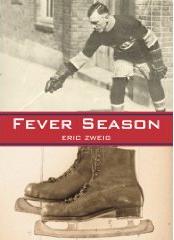| ________________
CM . . .
. Volume XVI Number 19. . . .January 22, 2010 
 |
Fever Season.
Eric Zweig.
Toronto, ON: Dundurn, 2009.
228 pp., pbk., $12.99.
ISBN 978-1-55488-432-2.
Grades 6-9 / Ages 11-14.
Review by Todd Kyle.
* /4
|
| |
|

Fourtenn-year-old Montrealer David, orphaned by World War I and the Spanish flu epidemic that followed, sets out to find his only living relative: his Uncle Danny, whose adoptive family ended up in Seattle and lost contact with David's mother. With help from the Jewish orphanage that takes him in, and their "Sabbath goy" J-P, David gets a job with the Montreal Canadiens mending uniforms, hoping to travel with the hockey team to Seattle for the Stanley Cup playoffs. As the team's fortunes rise and fall and David makes friends with early "enforcer" Joe Hall, the Canadiens travel to Seattle, where David finds his uncle. In the end, the Flu strikes the team, cancelling the series, and Hall dies from his illness.
This is a story with much promise. It combines historical fiction with real hockey history, written by an experienced sports writer. Young people will feel sympathy for David's plight and cheer for him as much as for the Canadiens.
But the book's potential is dampened by the rather poor overall writing and editing. The style is awkward, often abrupt. The point of view of the narrator is inconsistent, on occasion knowing only what David knows, and on occasion knowing the thoughts of minor characters. A scene where the team discusses David's future is described in detail, although David is not present; and yet the private lives of the players remain opaque at other times. Even the segments describing life during the War and the Flu, which kids should find fascinating, here seem awkward and superfluous. For example, before describing David's pride at helping empty the family's icebox, there is a lengthy background segment on how people used iceboxes instead of fridges at that time. There is often so much historical detail crowding the story that the overall effect is that of a background news story, not of fiction.
For hockey fans, the play-by-play of the games, and of the players' idiosyncrasies, certainly do satisfy and have a credible ring to them. But as with the historical detail, they are just a distraction. In the last chapters, much is made of the suspense of whether the Canadiens will lose the series and hence leave Seattle too early for David to complete his mission. But when David finally finds his uncle, as a result of work done by a local journalist, the scene is so sudden and so short as to be completely anticlimactic.
This excerpt, the last paragraphs of the book, illustrates the awkward style, superfluous detail, and seeming hurry to get the story over and done with:
It didn't seem fair. Just as David finally found a family to belong to again, he lost someone else. Joe Hall died in the Columbus Sanitarium at 2:30 in the afternoon on Saturday, April 5, 1919. His funeral was held three days later in Vancouver. Joe's mother, a brother, and a few other relatives lived in that city, and his wife and children were going to move there, too, so they could be close to the rest of their family.
David went to Vancouver, as well. His Uncle Danny took him there to attend the funeral. He hadn't been able to say a proper goodbye to his parents or sister. At least he was there to say one to Joe. He saw his children and told them how much their father had missed them when he was away, and what a good man "Bad Joe" really was, and that he would never forget him.
At least he could do that for his friend.
Note how the details of Hall's death seem disconnected from David's story –– facts from a newspaper, not ones that were real to him. Note also how the second paragraph makes it hard to distinguish which "he" is being referred to, David or Hall. And the last sentence is almost bizarre for a book that is not essentially about the friendship between David and Hall. One feels like asking "what friend?" In the end, sports and drama often make a great mix that kids will love, but not here.
Not Recommended.
Todd Kyle is a public library manager in Mississauga, ON, who has served on the jury of several children's literature awards in both official languages.

To comment
on this title or this review, send mail to cm@umanitoba.ca.
Copyright © the Manitoba Library Association. Reproduction for personal
use is permitted only if this copyright notice is maintained. Any
other reproduction is prohibited without permission.
NEXT REVIEW |
TABLE OF CONTENTS FOR THIS ISSUE
- January 22, 2010.
AUTHORS |
TITLES |
MEDIA REVIEWS |
PROFILES |
BACK ISSUES |
SEARCH |
CMARCHIVE |
HOME |
